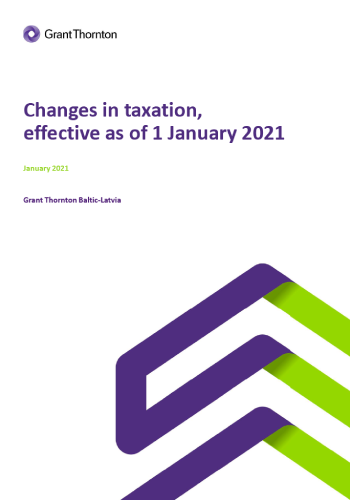Our experts have summarized a series of tax changes that will take effect on January 1, 2021. In 2021, changes are expected in these sectors - value added (VAT), personal income (PIT), patent fees, micro-enterprise, vehicle, excise and natural resources tax . Please see prepared a report below.
Amendments to the Value Added Tax Law, which enters into force on 1 January 2021
From 1 January 2021 to 31 December 2023, a reduced VAT rate of 5% will be maintained for certain fruit, berries and vegetables.
From 2021, the 30-day deadline for assessing and reimbursing VAT overpayments set during the Covid-19 crisis will be maintained.
From 1 July 2021, in Latvia, same as in other European Union (EU) Member States, the application of VAT exemption to goods in commercial consignments will be abolished. At present, VAT is not payable on goods consigned from outside the EU if their value does not exceed € 22. With the entry into force of the amendments to EU legislation, for all consignments received from outside the EU, regardless of the value and whether the consignee is a natural or legal person, it will be required to ensure import customs clearance. VAT on the goods will have to be paid starting from the first cent.
In order to ensure the implementation of the requirements of EU regulatory enactments, in the Electronic Customs Data Processing System, in addition to the existing import customs declarations (standard import customs declaration, import customs declaration for postal items), a new type of import customs declaration will be introduced - Import customs declaration for purchases up to € 150. This simplified import declaration can be submitted to the Customs if:
- The value of the goods does not exceed € 150 (excluding delivery costs);
- The consignment does not contain excise goods;
- The goods in the consignment are not subject to restrictions or prohibitions.
Companies offering and operating commodity trading platforms (eg Ebay, Amazon) will be considered a suppliers of goods from July 2021 and will accordingly be liable for VAT on supplies to non-taxable persons.
To implement the above changes, it is planned to introduce the new OSS (One Stop Shop) mode, which will serve as an extension of MOSS (Mini One Stop Shop) mode. The MOSS is a simplified voluntary VAT regime that allows taxpayers who supply telecommunications, broadcasting and electronic (TBE) services to EU consumers to declare and pay VAT in one Member State instead of in several Member States.
The new OSS will not only cover the above services. To facilitate cross-border online trade, the OSS will be extended to three schemes: other services (non-EU scheme), intra-EU distance selling of goods (Union scheme) and distance selling of goods imported from third countries or third territories in consignments with an internal value of less than € 150. The scheme for the distance selling of goods imported from third countries or third territories will be called IOSS (Import One Stop Shop). In addition, small consignments up to € 22 will no longer be exempt from VAT.
Related changes to declarations:
- The deadlines for submission of the VAT special treatment declaration will be changed from the 20th day of the following taxation period to the end of the month of the following taxation period (for importers - one month, for EU and non-EU schemes - one quarter);
- If corrections to the previous declaration are necessary, it will now be possible to make such corrections through the next period declaration (until now, corrections could only be made in the declaration for the paricular period);
- Extension of the VAT special treatment declaration to include data on distance sales of goods in the EU (B2C). Until now, the declaration covered only TBE services;
- Extension of MOSS to distance selling (B2C) supplies within and outside the EU regime. Until now, MOSS includes only TBE services;
- A threshold of € 10 000 has been set not only for electronic services, but also for distance sale of goods.
From 1 January 2021, the income threshold is raised from € 1 200 to € 1 800 per month, up to which the non-taxable minimum applies.
From 1 January 2021 the progressive rate of PIT shall be reduced
The highest rate of the PIT progressive rate is currently 31.4%. It is reduced to 31% (for the income part over € 62 800), keeping the other PIT rates unchanged - 20% (for income up to € 20 004) and 23% (for the income part from € 20 004.01 to € 62 800).
The patent fee payment regime is canceled as of 1 January 2021
From 1 January 2021, the regime for the payment of patent fees is canceled, maintaining only the regime of reduced patent fees (for pensioners and persons with disabilities of groups 1 and 2). Transitional provisions: Taxpayers who have paid the patent fee for 2021 by 31 December 2020 will be able to apply the patent fee regime also in 2021 for the period for which the patent fee was paid, but not longer than until 31 December 2021.
From 1 January 2021 it is possible for an employee to receive compensation from the employer for the employee's expenses related to remote work
- Compensation norms not subject to PIT have been adjusted to include the employer compensation to the employee for expenses related to remote work;
- The employee does not have to submit receipts to the employer not to create an unnecessary administrative burden;
- The amount of reimbursable expenses per month may not exceed € 30 (excess is subject to PIT);
- Reimbursable expenses are conditionally divided into 4 groups, which can be reimbursed by the employer, each group not exceeding the following amount:
1) depreciation of workplace equipment (computer, software, work desk, etc.) - € 30 per month;
2) low-value items (stationery, etc.) - € 10 per month;
3) utility payments - € 6 per month;
4) subscription fee (does not include installation fee):
- for a phone – € 7 per month;
- Internet – € 7 per month.
From 1 January 2021 automatic repayment of PIT overpayment is possible
It is planned to introduce the procedure of automatic repayment of PIT overpayment, for persons who do not have to submit declarations.
Amendments to the Law have enter into force on January 1, 2021, but the process of automatic repayment of PIT overpayment will take place starting from 2023in respect of PIT for 2022.
As of 1 January 2021 the regulation on PIT overpayment refunds enters into force
Regulation ensures that the SRS does not reimburse PIT overpayments if the PIT payer has not submitted a declaration for any of the previous taxation years in which the PIT payer has a PIT surcharge.
The mentioned regulation will also apply to those taxpayers who have to submit a declaration for the tax years 2018 and 2019 and the calculated PIT payment term is 1 December 2020, and according to the information available to the SRS, a PIT surcharge is formed.
In addition, the most significant changes in the PIT law:
- It is clearly stated that income arising from reduced or canceled liabilities is taxable;
- Income from receiving state-funded pension capital as an inheritance will be taxed;
- It has been determined that the payer is also entitled to apply for eligible expenses for education and medical treatment for a brother or sister - a person with a group 1 or 2 disability;
- Types of economic activity expenses specified;
- Exemption from the Tax on winnings received in public advertising campaigns, as well as low-value representation items;
- Tax will not apply on benefits paid from the state budget for the birth of three or more children born in one birth;
- It is clearly defined in which case the income is qualified by economic nature;
- Advance payment terms have been balanced and other technical and editorial adjustments have been made.
Amendments to the Solidarity Tax Law, which entered into force on 1 January 2021
A solidarity tax rate changes to 25% instead of the current 25.5%.
As of 1st January 2021, the minimum wage has been increased
From 1 January 2021, the minimum wage is raised from € 430 to € 500 per month.
Amendments to the Tax Regulation for Income from the Exercise of Share Purchase Options as of January 12, 2021
As of 12 January 2021, the exemption from payroll tax on income from the exercise of share purchase options shall also apply to the income received as a result of the exercise of share purchase options in a limited liability company.
In addition, a number of other conditions have been changed:
- the minimum holding period has been reduced from 36 to 12 months
- the right to purchase shares may be exercised even after termination of employment - not later than within 6 months
- if the capital company has issued a loan for the purchase of share purchase options, the loan must be repaid until the moment of exercise of share purchase options.
From 1 January 2021 the social insurance rate shall be reduced
From 1 January 2021, the social insurance rates are reduced. For example, rates are reduced from 35.09% to 34.09% - by 0.5 percentage points for both employers and employees. Thus, the contribution rate is 23.59% for the employer and 10.50% for the employee. Employer-pensioner employer rate reduced from 21.31% to 20.77% and employee-retiree employee rate reduced from 9.56% to 9.25%, etc.
From 1 July 2021 the minimum object of mandatory contributions will be introduced
The minimum object of mandatory contributions per quarter is three minimum monthly salaries. If a person is an employee of several employers or an employee and a self-employed person at the same time, the objects of mandatory contributions declared for the person are summed up.
The minimum wage is € 500 and the minimum social contributions are planned at € 170 per month for workers who are insured.
If the wage is less than three minimum wages per quarter, the difference between the social tax paid and the minimum tax will be covered by the employer. Mandatory minimum social contributions will be paid by employers in proportion to how much and with what salary a person works for each employer.
The amendments also define the groups of persons to whom the minimum mandatory contributions will not apply. These include people who have reached retirement age or have been granted an old-age pension, people with group 1 and 2 disabilities, people with children under the age of three or children with disabilities, people who work in a social service or provide an assistant service. Also, the minimum contributions will not have to be paid for a seasonal agricultural worker, as well as for employees with a foreign employer.
Amendments to the Law “On Excise Tax”, which entered into force on 1 January 2021
From 1 January 2021:
- The law clarifies several definitions;
- A gradual increase in excise duty rates on tobacco products, as well as the introduction and gradual increase of the excise duty rate on components for the preparation of liquids used in electronic cigarettes and tobacco substitutes;
- Certain conditions are laid down that heated tobacco, liquids used in electronic cigarettes, ingredients for the preparation of liquids used in electronic cigarettes and tobacco substitutes are marked with excise duty stamps. The provision provides for a transitional period until 1 July 2021.
Amendments to the Law on Vehicle Maintenance Tax and Company Car Tax, which entered into force on 1 January 2021
From 1 January 2021, changes in vehicle taxes provide for:
- To balance the vehicle operating tax rates for passenger cars and trucks with a gross vehicle weight of up to 3 500 kg and the procedure for their calculation;
- To determine the procedure for calculating the bus and truck vehicle operation tax in accordance with the level of their engine emissions;
- Introduce a new car registration tax with the aim of preventing the registration of old and ecologically harmful cars in Latvia.
In accordance with the new Cabinet Regulation No. 819, the list of low-tax or tax-free countries and territories changes. Accordingly, low-tax or tax-free countries and territories are:
- The territory of Anguilla;
- US Guam territory;
- US Samoa territory;
- US Virgin Islands territory;
- Barbados;
- Republic of the Fiji Islands;
- Republic of Palau;
- Republic of Panama;
- Independent State of Samoa;
- Republic of Seychelles;
- Republic of Trinidad and Tobago;
- Republic of Vanuatu.
From 1 January 2021, it is planned to gradually limit the MET regime
As of 1 January 2021, the MET is limited to one person - the owner of a micro-enterprise.
Starting from 1 January 2021, the MET rate for turnover up to € 25 000 per year is 25% (instead of the current 15%), but for the share of turnover above € 25 000 per year - 40%.
A VAT payer is not able to become a payer of MET, but by becoming a VAT payer, with the next taxation period, a person will lose the right to apply for the status of a micro-enterprise taxpayer.
As of 1 January 2021, limited liability companies (LLCs) will no longer be able to acquire the status of MET payer, but from 1 January 2022, LLCs already registered as MET payers will no longer be able to be payers of METs.
If the payer of the MET has employees (except for the sole owner), they will be subject to labor taxes in accordance with the general procedure in accordance with the Law on Personal Income Tax and the Law on State Social Insurance. Accordingly, employees with whom the MET payer will enter into employment on 1 January 2021 will be subject to labor taxes in the general manner from the first official working day.
A transitional period until 30 June 2021 is set for already hired employees of micro-enterprises, during the transitional period the previous MET Law regulation will be applied.
The law limits the salary of an employee of a MET payer - € 720 per month, applicable from 1 January 2021.
Payers of MET’s are now able to distribute dividends, contingent dividends and dividend-like income without applying PIT when distributing profits after 31 December 2020. The liquidation quota will not be taxed in the amount of retained earnings if profits after 31 December 2020.
The current distribution of the MET contirubutions is maintained (20% PIT and 80% social insurance).
As of 1 January 2021, the exemption for CO2 emissions for the use of peat in stationary technological equipment is abolished.
As of 1 January 2021, 2022 and 2023, the natural resource tax rates are increased:
municipal and industrial waste, which is not considered hazardous waste, to € 65 per tonne in 2021, € 80 per tonne in 2022, € 95 per tonne in 2023;
for hazardous and industrial waste, which is considered hazardous waste, to € 70 per tonne in 2021, € 85 per tonne in 2022, € 100 per tonne in 2023.
From 1 January 2021, the state budget payments administered by the SRS have a new account - Single Tax Account, which will replace the existing tax accounts.
- Title: Single Tax Account;
- Beneficiary: State budget (SRS)., Registration no. 90000010008;
- Receiving institution: Treasury, BIC code TRELLV22;
- Account number: LV33TREL1060000300000.
All declarations that are already due by the 20th date will retain their current deadlines, such as VAT, CIT, Excise duty and Natural resource tax returns.
New declaration deadlines - for the electricity tax (20th date), the lotteries and gambling tax (15th date) and for the submission of the employer's report (17th date).
All regular domestic taxes administered by the SRS will have one payment term - the 23rd day of each month.
Customs duties will have to be paid into the Single Tax Account from 2023. Until then, the current procedure remains.
Real estate tax does not have to be paid in the Single Tax Account.
The amount of money paid into the Single Tax Account will be divided to cover the taxpayer's liabilities by types of taxes, following the FIFO principle - first in, first out.
As of 1 January 2021, the accrual principle will be introduced in the accounting of state revenue administered by the SRS, which means that according to it accounting transactions and other events are recognized when they occur (and not at the time when the money is received or paid to the Treasury). Taxpayer ill also be able to see both the calculated liabilities and the payments made for each tax in EDS.



